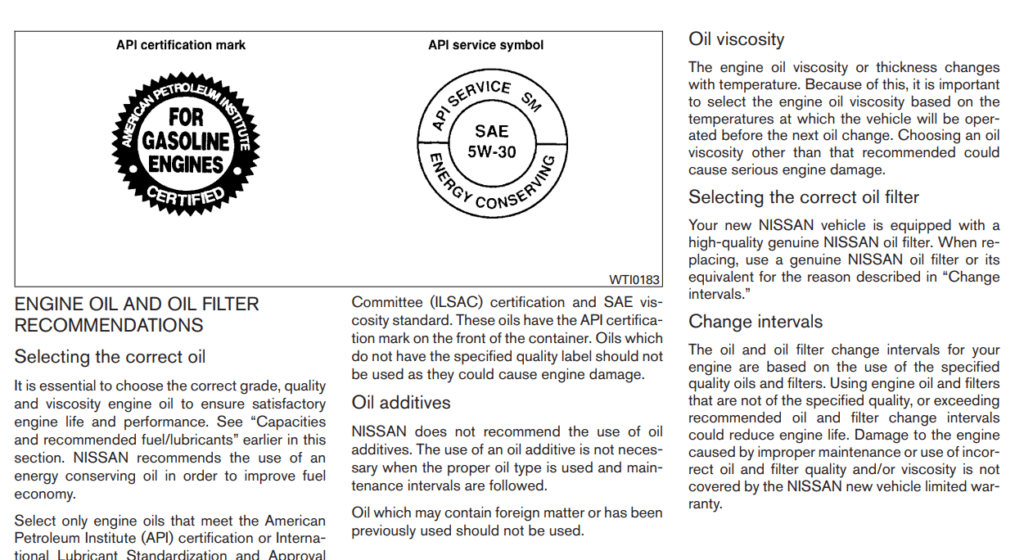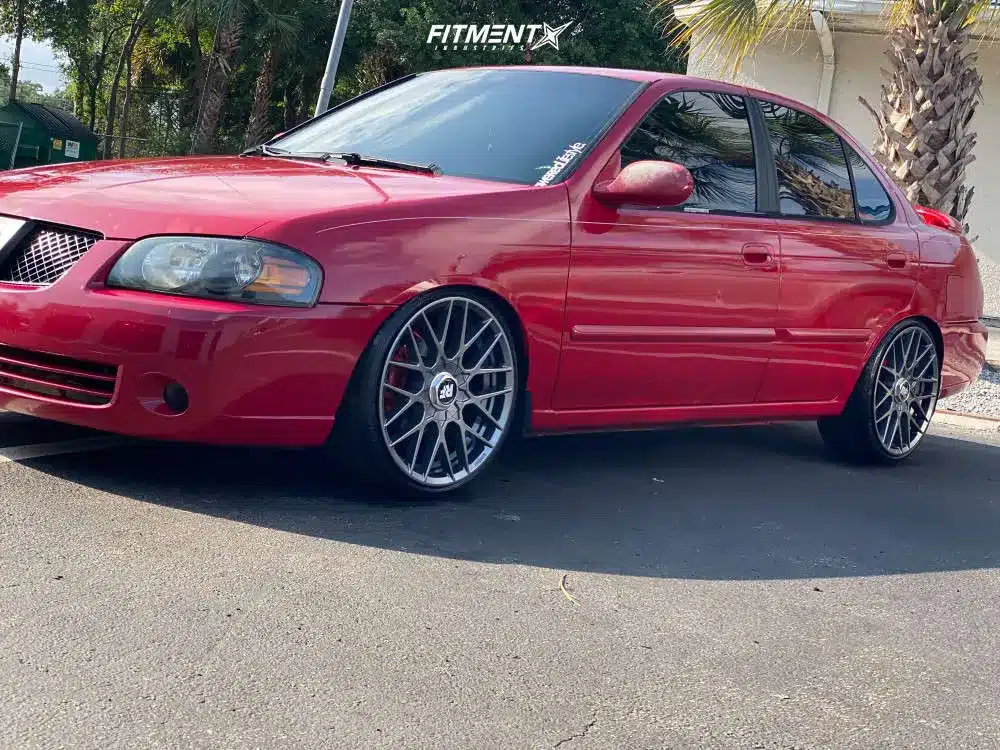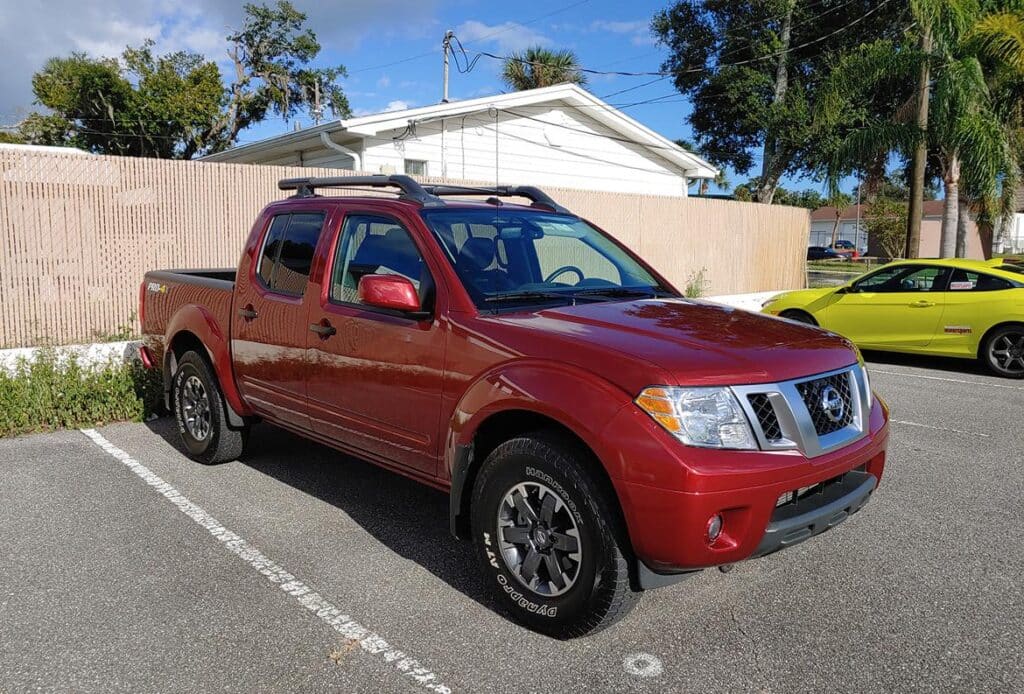Choosing the correct oil type for your 2012 Nissan Altima is crucial for maintaining optimal engine performance, fuel efficiency, and longevity. Using the wrong oil can lead to decreased engine efficiency, increased wear, and potential damage, ultimately affecting your vehicle’s performance and reliability.
What Type Of Oil Does A Nissan Altima Take 2012?
For the 2012 Nissan Altima, choosing engine oil with an API (American Petroleum Institute) Certification Mark is essential. This mark indicates that the oil meets or exceeds the necessary performance requirements and protects your vehicle’s engine against wear and tear. The API certification mark is found on the front of the oil container, providing confidence in the oil’s quality and compatibility for your Altima.
The recommended viscosity for the 2012 Nissan Altima is SAE 5W-30. Viscosity refers to the oil’s resistance to flow, with a lower number indicating a thinner oil. A 5W-30 oil is designed to perform well in a range of temperatures, providing optimal protection for your engine in both cold and hot conditions. Using the correct viscosity oil ensures proper lubrication, reduces engine wear, and maintains fuel efficiency. Always consult your owner’s manual for the manufacturer’s specific oil viscosity recommendations.
Selecting the Correct Oil
Selecting the right grade, quality, and viscosity of engine oil is crucial for your 2012 Nissan Altima’s engine life and performance. The correct oil ensures proper lubrication, reduces friction and wear, and helps maintain optimal engine efficiency. Always refer to your owner’s manual for the manufacturer’s specific recommendations.
Nissan recommends using energy-conserving oil to improve fuel economy in your 2012 Altima. These oils are formulated to reduce friction and viscosity loss, ensuring better engine efficiency and fuel savings. Look for oils with an “Energy Conserving” label on the API certification mark.
Choose engine oils that meet the American Petroleum Institute (API) and International Lubricant Standardization and Approval Committee (ILSAC) certification standards. These certifications indicate that the oil has undergone rigorous testing and meets the performance requirements set by the industry. API-certified oils have the API certification mark on the front of the container, while ILSAC-certified oils typically display the ILSAC starburst symbol.

Avoid using oils that do not have the specified quality labels or certifications, as they may not provide adequate protection for your engine and could cause damage. Using oils without the proper certifications may void your vehicle’s warranty and lead to costly repairs. Always choose oils with the API certification mark and, if possible, the ILSAC certification to ensure the best performance and protection for your 2012 Nissan Altima’s engine.
Oil Additives
Nissan does not recommend the use of oil additives for your 2012 Altima. According to the manufacturer, using the correct oil type and following the recommended maintenance intervals is sufficient for maintaining your vehicle’s engine performance and longevity. Adding oil additives may not provide any additional benefits and, in some cases, may even cause harm to the engine.
Importance Of Using Proper Oil Type And Maintenance Intervals
Using the proper oil type and adhering to the recommended maintenance intervals is essential for ensuring optimal engine performance, fuel efficiency, and longevity. Regular oil changes with the correct oil type help maintain proper lubrication, reduce engine wear, and prevent the buildup of harmful deposits.
Neglecting oil changes or using the wrong oil type can lead to reduced engine performance, increased fuel consumption, and potential engine damage. Always follow Nissan’s recommendations for oil type and maintenance intervals as outlined in your 2012 Altima’s owner’s manual.
Oil Viscosity
Oil viscosity, or thickness, changes with temperature. When the temperature drops, the oil becomes thicker, while it thins as the temperature rises. This change in viscosity can affect the oil’s ability to properly lubricate your engine’s moving parts. As a result, it is important to choose an engine oil with a viscosity that can withstand the temperature range your vehicle will be exposed to between oil changes.
For the 2012 Nissan Altima, the recommended oil viscosity is SAE 5W-30. This oil has a low-temperature viscosity of 5W, which ensures proper flow and lubrication in colder conditions, and a high-temperature viscosity of 30, which provides adequate protection when the engine is operating at higher temperatures. Using an oil with a different viscosity than recommended can lead to poor engine performance, increased wear, and potential damage.
Oil Filter Selection
Using genuine Nissan oil filters for your 2012 Altima is crucial for maintaining optimal engine performance and longevity. These high-quality filters are specifically designed for your vehicle and meet the manufacturer’s stringent specifications. Genuine Nissan oil filters efficiently capture contaminants and debris, preventing them from circulating through your engine and causing damage. When replacing the oil filter, it is advisable to use a genuine Nissan oil filter or an equivalent filter that meets the same quality standards to ensure proper engine protection.
The oil and oil filter change intervals for your 2012 Altima’s engine are based on the use of the specified quality oils and filters. Adhering to the recommended change intervals is important for maintaining engine life and performance. Using engine oil and filters that do not meet the specified quality, or exceeding the recommended change intervals, can result in reduced engine life and potential damage.
Oil and Filter Change Intervals
The frequency of oil and filter changes for your 2012 Nissan Altima depends on various factors, including how you use your vehicle, your driving environment, and the quality of the oil and filters you use. Following the recommended maintenance schedule in your owner’s manual is essential to maintaining your engine’s performance and longevity.
Certain driving conditions may necessitate more frequent oil and filter changes for your Altima. These conditions include:
- Repeated short-distance driving in cold outside temperatures
- Driving in dusty conditions
- Extensive idling
- Towing a trailer
- Stop-and-go commuting
If your vehicle is regularly exposed to these conditions, it’s important to monitor your oil level and quality and follow the maintenance recommendations in your owner’s manual.
Engine oil capacity for QR25DE (4-cylinder) and VQ35DE (V6) engines
The engine oil capacity for the 2012 Nissan Altima varies depending on the engine type:
- For the 2.5 QR25DE (4-cylinder) engine: The oil capacity, including the oil filter change, is 4.6 liters (4-7/8 quarts).
- For the 3.5 VQ35DE (V6) engine: The oil capacity, including the oil filter change, is 4.8 liters (5-1/8 quarts).
Checking Engine Oil Level
To ensure your 2012 Nissan Altima’s engine performs optimally and lasts longer, it’s essential to monitor and maintain the correct engine oil level. Here’s a step-by-step guide to checking your vehicle’s oil level using the dipstick:
- Park the vehicle on a level surface and apply the parking brake.
- Start the engine and let it idle until it reaches operating temperature.
- Turn off the engine. Wait more than 10 minutes for the oil to drain back into the oil pan.
- Locate the dipstick, remove it, and wipe it clean using a lint-free cloth or paper towel.
- Reinsert the dipstick all the way into its tube.
- Remove the dipstick again and check the oil level. It should be between the H (High) and L (Low) marks. This is the normal operating oil level range.
Maintaining your engine oil level within the recommended range is crucial for your vehicle’s performance, fuel efficiency, and engine longevity. If the oil level is below the L (Low) mark, it can cause increased friction, heat, and wear, leading to reduced engine life and potential damage. Overfilling the engine oil can also be harmful, as it may cause excessive pressure, foaming, or even leaks.
If you need to add oil, remove the oil filler cap and pour the recommended oil through the opening. Be careful not to overfill, and always recheck the oil level using the dipstick after adding oil.
Conclusion
In this article, we have discussed the importance of using the correct oil type in a 2012 Nissan Altima. We covered the recommended engine oil (API Certification Mark and viscosity SAE 5W-30), the significance of selecting the correct oil grade, quality, and viscosity, and Nissan’s recommendation for energy-conserving oil. We also explored API and ILSAC certifications, oil additives, oil viscosity, oil filter selection, oil and filter change intervals, checking engine oil level and maintaining oil level within the recommended range.
Following Nissan’s recommendations for engine oil type, viscosity, and maintenance intervals is essential for optimal engine performance, fuel efficiency, and engine longevity. Properly maintaining your 2012 Nissan Altima’s engine oil and filters will help prevent engine damage, reduce wear, and ensure a smooth and enjoyable driving experience.










